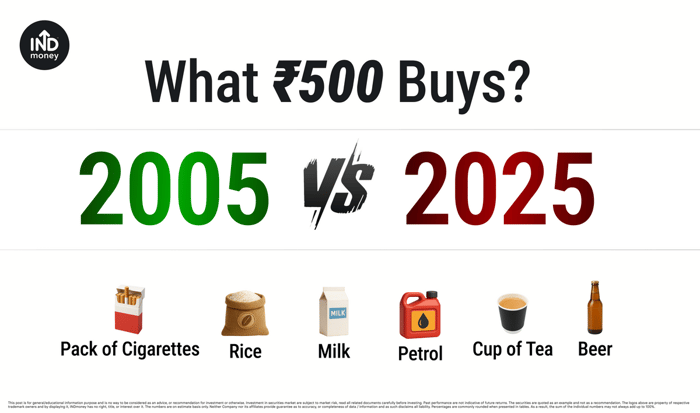
- Let’s Look at the Numbers
- So, What Exactly Is Inflation?
- Why Does Inflation Happen?
- A Simple Example
- What Inflation Means for You
- Final Words
Imagine this. You open your wallet, take out a ₹500 note, and think, this feels like good money, right?
Now, let’s rewind 20 years to 2005.
That same ₹500 note could buy you a full basket of groceries, a few litres of petrol, and still leave enough for a movie night and a cup of tea.
Fast forward to 2025, and that same ₹500 can barely cover one dinner for two.
What changed? The answer is inflation.
You can also calculate the inflation through the Inflation Calculator.
Let’s Look at the Numbers
Here’s how much ₹500 could buy in 2005 versus today:
| Item | 2005 Price | 2025 Price | ₹500 Could Buy (2005) | ₹500 Could Buy (2025) |
| Rice (per kg) | ₹13 | ₹48 | 38 kg | 10 kg |
| Milk (per litre) | ₹18 | ₹60 | 27 L | 8 L |
| Petrol (per litre) | ₹38 | ₹105 | 13 L | 4.7 L |
| Movie Ticket (avg.) | ₹60 | ₹120 | 8 tickets | 4 tickets |
| Bus Fare (avg. city ride) | ₹4–₹5 | ₹20 | 100 rides | 25 rides |
| Cup of Tea (local shop) | ₹3 | ₹15 | 166 cups | 33 cups |
In short, what you could once buy with ₹500 in 2005 now costs over ₹1,800–₹2,000 in 2025.
That’s the silent power of inflation.
You can also look at our Instagram post for a quick look. The link
So, What Exactly Is Inflation?
Inflation means that the prices of goods and services increase over time, and as a result, the value (or purchasing power) of money decreases.
Put simply, ₹500 in 2005, ≠ ₹500 in 2025.
It’s still the same note, but it buys much less today.
Here’s how to think of it:
- Inflation doesn’t mean you have less money.
- It means your money buys you less than before.
Why Does Inflation Happen?
Inflation happens for many reasons, some natural, some policy-driven:
- Higher demand: When more people want the same goods, prices rise.
- Rising input costs: If fuel, labour, or materials become costlier, companies pass it on to consumers.
- Government spending: When more money is pumped into the economy, prices can rise faster.
- Global events: Wars, pandemics, or supply shortages can make everyday goods expensive.
Inflation isn’t always bad.
A moderate level (around 4–6%) shows the economy is growing.
But high inflation, like 8–10%, eats into savings and affects everyone, especially fixed-income households.
A Simple Example
In 2005, a cup of tea cost ₹3.
You could drink 166 cups for ₹500.
Today, that same cup costs ₹15; you’d get only 33 cups for ₹500.
That means, over 20 years, the price of tea increased 5 times.
But did your salary or savings also grow 5 times?
If not, your purchasing power has actually fallen.
What Inflation Means for You
- Your savings lose value if kept idle.
- If you kept ₹1 lakh under your mattress in 2005, it still says ₹1 lakh today, but it buys much less.
- That’s why investing is important: to make your money grow faster than inflation.
- Investing beats inflation.
- Bank FDs, mutual funds, or equities all aim to grow your money at a rate higher than inflation, so your real wealth increases.
- Inflation affects everything, from tea to tuition fees.
- That’s why financial planning for the long term is key.
Final Words
Inflation is like slow rust; it quietly erodes the value of your money over time.
You can’t stop it, but you can outgrow it.
In 2005, ₹500 felt powerful.
In 2025, it feels lighter.
In 2045, who knows, it might only buy you two cups of coffee.
That’s why smart investors don’t just save, they invest with inflation in mind.
Disclaimer: The content is meant for education and general information purposes only. Past performance is not indicative of future returns. Mutual Funds are non-exchange traded products, and INDstocks is merely acting as a mutual fund distributor. All disputes with respect to distribution activity, would not have access to the exchange investor redressal forum or arbitration mechanism. Mutual Fund investments are subject to market risks, read all scheme related documents carefully before investing. INDstocks Private Limited (formerly known as INDmoney Private Limited) 616, Level 6, Suncity Success Tower, Sector 65, Gurugram, 122005, SEBI Stock Broking Registration No: INZ000305337, Trading and Clearing Member of NSE (90267, M70042) and BSE, BSE StarMF (6779), AMFI Registration No: ARN-254564, SEBI Depository Participant Reg. No. IN-DP-690-2022, Depository Participant ID: CDSL 12095500, Research Analyst Registration No. INH000018948 BSE RA Enlistment No. 6428.